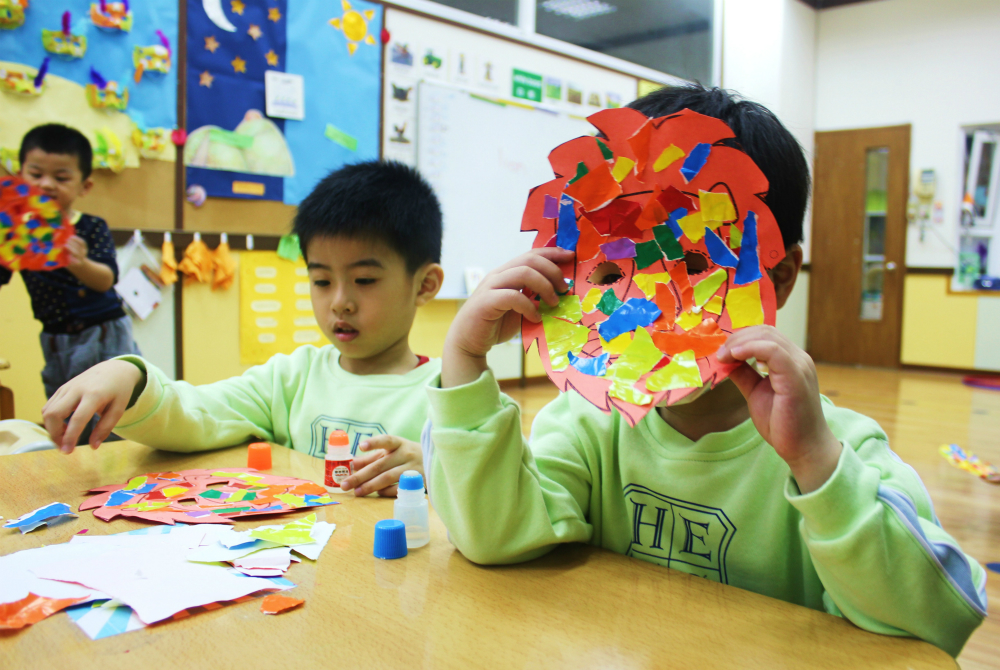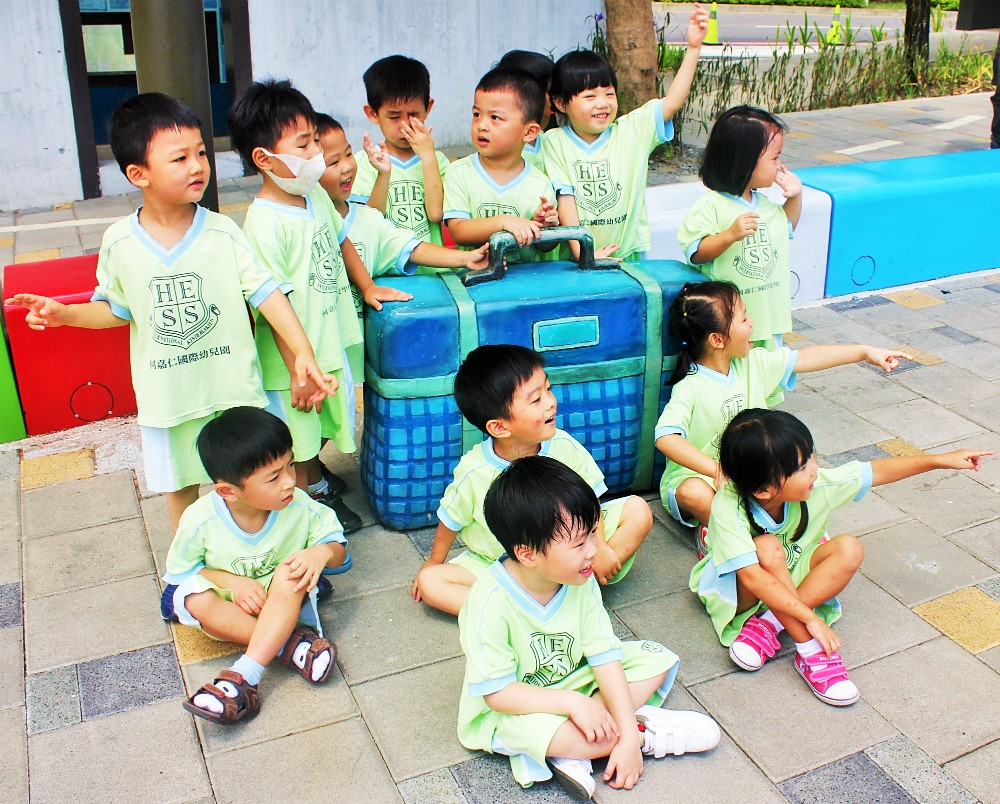Debunking 5 Myths about Teaching English in Taiwan

Thinking about teaching English in Taiwan? Teaching overseas, as anyone who has done so will tell you, is quite an experience. You move to a new place, discover a completely different culture and way of life, work with amazing people from around the world, meet children who inspire you, and learn more about your native language than you ever have before (even after doing an English degree!)
But, it’s important to remember that everyone’s experience is different. Though I enjoyed my time living and teaching in Taiwan, there are people who don’t. Moving miles away from home, being in completely new territory and, of course, the language barrier make the whole idea of being an expat really daunting. What makes that feeling even worse, is hearing a lot of rumours about what ESL teaching in Taiwan is really like.
During the year I spent teaching English in Taiwan, I realised that there are a lot of common misconceptions about how teaching works out there. Here are five common myths about teaching in English in Taiwan that need to be dispelled:
1. I’ve heard bad things about teaching in China
Mention Taiwan to someone and there are three very likely outcomes: 1) They’ll think you’re talking about Thailand, 2) They’ll have heard of Taiwan but have no idea where it is on a map, or 3) They’ll have heard of it and think it’s in China.
Taiwan is a little, sweet potato shaped island which sits in the Pacific Ocean to the east of mainland China, but is not in China. In fact, China does not control Taiwan, though is does ‘claim’ Taiwan as part of its territory. This means that Taiwan has its own separate government and is a very different place from mainland China.
Teaching English in China and teaching English in Taiwan are completely different experiences. If you’ve heard bad things about teaching in China, it’s probably not going to be the same in Taiwan!
2. I can’t speak Chinese, so I can’t be a teacher
This is totally not a problem. To teach English in Taiwan, and in fact in most of Asia, you don’t need to be bilingual. As long as you’re a native English speaker (i.e. American, British, Canadian, Aussie, a New Zealander or South African) then you can be an English teacher. In Taiwan, there is a definite preference for the American accent, but being from elsewhere won’t count against you. I’m British and getting a teaching job was absolutely no problem.
Worried about children speaking to you in Chinese? In the language schools, there is usually an ‘English-only’ environment, meaning that in the classroom, no Chinese is allowed. The idea is that children get used to speaking and thinking only in English and that the teacher doesn’t have to worry about the class nattering away in Chinese. For the most-part, this method works.

My incredibly bright class of 12 year olds.
3. I can’t afford to move overseas to teach
If you can afford the cost of the flight, once you’re in Taiwan everything is extremely cheap. We’re talking about 70p ($1.20) for a big bowl of noodles. Of course, setting yourself up in an apartment can be a stretch, but the bigger language schools in Taiwan (also the schools where most first time ESL teachers will work) offer an interest free loan to cover your first month or two.
This isn’t a con! There is a high demand for native speaking teachers in Taiwan, and for the schools, an interest free loan is a good incentive to encourage foreigners to come and teach. After two months of teaching, you’ll probably be in the clear (unless you’re a wild spendthrift) and beginning to start saving money. Compared to the cost of living, the wages for native English teachers are good, so it might not cost as much as you think to move overseas to teach.
4. Teaching Kindergarten in Taiwan is illegal
Actually, this is technically true. It is currently illegal for native English teachers to be teaching children under the age of 5. However, English kindergartens are everywhere – I’m not kidding, they are on practically every street corner. The law on teaching kindergarten in Taiwan is very changeable and the whole issue is often considered a bit of a grey area.
Despite it currently being illegal, there is an incredibly high demand – from parents especially – for native English kindergarten teachers. Many Taiwanese kids begin learning English at the age of 2 or 3, if not earlier, and often parents are keen for their children to have perfect English to further their career prospects and also as a point of pride. As such, the government tends to turn a blind eye. However, if you do choose to take on a kindy job, check to see if there is a relevant clause in your teaching contract before signing.
5. All Taiwanese children are angels
Teachers can dream! There is no such thing as the perfect class, and all children have off days. That said, many of the Taiwanese kids are super well-behaved – certainly more so than their British counterparts – which is mostly due to parental expectations. Many of the kids attend buxibans (or cram schools) where they work really hard to do well academically. Naturally this means that kids are tired and sometimes cagey by the time they crawl into your classroom, bag dragging on the floor behind them.
That said, I would say that 90% of my students were well-behaved. The other 10% consisted of kids who were considered to be ‘under-achieving’ no matter how hard they worked, those that found speaking in English all the time really challenging, and a minority of tearaways. Being a teacher is about finding ways to engage children of all levels, if you can do that then classroom behaviour is usually under control. At the end of the day, you will probably learn as much from your students as they do from you.
Do these myths sound familiar to you? Are there any other rumours you’ve heard about teaching English in Taiwan?









Kenn Loewen
Myth – In 15 years the cost of living has increased significantly but the wages have not increased and have, in fact, lowered in many places.
True – In fact, with 13 years of experience teaching English in Taiwan, when applying for a new job here I am offered the same amount as when I got of the plane, spoke no Chinese and had never set foot in the classroom. It can be great, but never expect to make more money, be shown that you are appreciated for the work you do, get a paid sick day or a paid holiday. Some truth with your truths.
Charlie on Travel
Hey Kenn, interesting to hear from someone who has been out in Taiwan for a long time. That’s unfortunate to hear that the wages haven’t increased despite your experience as a teacher and time living/working in Taiwan.
Have you worked in many different schools during your 13 years of teaching?
In the school where I worked, the more experienced teachers has slightly better pay (though it wasn’t a significant amount more for the years of experience they had, admittedly).
Emup Itsgay
I was going to say the same thing! Salaries haven’t increased. Furthermore, working for a buxiban is often very discriminatory and can leave you with a terrible taste in your mouth.
Charlie on Travel
It’s a shame to hear that you’ve also had similar experiences working as a teacher in the long term.
david
I spent 7 years in Taiwan about half of that time was good. Pollution, low salary and, the crowds of people did me in. I was happy when I left there for good.
Charlie on Travel
At least you found some of the time good. Were you living in Taipei, or down the west coast? I was on the east coast and there was no pollution, my salary was good for the cost of living in the small town I was in, and there were no crowds. I know that experiences in Taiwan can be really different depending on where you live though.
Lana
How did you get the job on the east coast? I want to show up and look around, but not sure how to find the jobs there?
Charlie on Travel
Hi Lana. We found a job before leaving for Taiwan, through HESS. There are many language schools there though and you would certainly be able to find something if you’re a native speaker by turning up and going in person.
francaangloitalian
Interesting! I’ve never taught abroad myself and I’m not sure if I could, it sounds like hard work indeed despite being very rewarding I believe.
Charlie on Travel
It was really hard work, and I much prefer being a writer (which is also because I’ve always loved writing, and have never had the ‘passion’ to teach that others do). But yes, teaching is undeniably rewarding, and in the space of a year, it’s amazing how much kids can improve!
Michael Turton
Please take down number 4. Advocating that people engage in activity that is illegal is simply wrong on so many levels. Teaching in a kindy is illegal. It is not a gray area, though the law is blithely ignored. What it means is that foreign kindy teachers are always vulnerable. What it means is that in some cases teachers will find themselves unable to get insurance or to deal with evil managers via official channels. You can also be caught in a police raid and deported, since kindergartens frequently report on rivals in order to get them busted by the police and shut down. Since you’re handing out advice, what do you think teachers should do in a police raid?
Michael
Charlie on Travel
Hi Michael, thanks for your comment. As I did say under number 4, it is actually true. I’m not saying that teaching kindy isn’t illegal, I’m just saying that it isn’t uncommon despite this fact. You are correct, foreign kindy teachers are vulnerable, and those considering teaching kindy should do so in full knowledge of what they are doing and what the consequences could be.
I’m not handing out advice, I’m speaking from my own personal experiences about teaching in Taiwan. I’m neither encouraging nor deterring readers to teach in Taiwan. Anyone who is considering doing so should do their research and be fully informed before signing up to teach in an ‘illegal’ kindy.
Where I worked, the kindy was inspected by the police a few times a year – and one of those police officers was a parent to a child in an all-English kindy class. When I say the law is grey and murky, I don’t just mean on the part of the schools and teachers who are ignoring it.
Are you currently teaching in Taiwan? Do you know others who have been subject to police raids? I’d be very interested to hear more about it.
Arturo Bandini
It is a grey area, many locals dont know it’s illegal. I can only assume you didn’t work in one of the Hess schools that has hidden rooms for such eventualities? I worked in a school (Not Hess, but one of the other chains) and after a parent went off the deep end and phoned the local authorities we came into work one day only to find it had been upgraded to levels not unlike the UK TECO office in Taipei with it’s secret 3 way mirrors and needing either a 4 digit to unlock the front door or to be buzzed in by the receptionist. The kindy teachers were told in the event of someone coming into their class and telling them to run, they should not ask questions, climb out of the kitchen window and wait around the corner until they get phoned back.
As for actual deportations I only know of two personally, and one of those was simply because the teacher has cheated on his girlfriend who also happened to be his teaching assistant so she phoned the authorities herself. The other was bad luck…generally as you say, nobody really cares and chabuduo rules. However you only need to get unlucky once, then you have 30 days to leave the country, and a nice big new no entry stamp in your passport.
Charlie on Travel
Hi Arturo! Some interesting stories about the deportations there. I was fortunate not to meet anyone who had suffered the same fate, but it is certainly a risk that you take.
I’ve also heard some schools are more strict/strange than others on their policies for inspections. Our HESS branch sent us off to upstairs classrooms if the inspection was out of the blue, but actually one of the parents of a kid at the school was the inspector, so the school nearly always knew which morning the inspection would be and told it’s foreign teachers to stay at home and take that morning off.
Mando
“It’s not a grey area, though the law is blithely ignored.”
LOL
Sharon
They all look so cute and happy to be learning with you. It is not only a wonderful gift to be a good teacher (hard work and exhausting too of course) but when it can be mutually beneficial and rewarding, it is certainly something to consider.
Charlie on Travel
Thanks, Sharon. They were all really lovely children. Yes, I think you’re right, and teaching is very rewarding, but oh so much hard work!
Ken Kai
Interesting article Charlie.
I’m going to Taiwan soon. We wanted to start a restaurant over there. I may do some English teaching as well as part time modeling. Oh, and of course the travel blog adventure’s, too!
Great little read Charlie, thanks a lot.
Cheers,
Ken
Charlie on Travel
Looking forward to reading your Taiwan updates for sure! I loved it there, though people have very different experiences. Will you be going to Taipei?
Thanks for commenting :)
Polly
I’ve heard good things about Taiwan – particularly from teachers who left Russia to go there. They said that compared to Russian students, Taiwanese kids really ARE angels ;)
Charlie on Travel
Haha! Well that’s an interesting comparison!! :)
Marie-Carmen
Completely understand number 5!
I teach in China and you tend to get a lot of kids in the classes (35 4 years old kids in one class… it’s hard work), there is always a 10% of those students that just don’t want to behave and can’t focus so long;
So yep, it’s not easy to teach everyday but it can be very rewarding!
I’m looking forward to teach in China to see how different it might be from the mainland!
Thanks for sharing!
Charlie on Travel
Hey Marie, thanks for reading.
Wow, those class sizes are huge!! We rarely had classes that big. Mostly our classes had around 15-20 kid, though sometimes less and sometimes more. But yes, I’d say around 5-10% of kids have a difficult time focusing.
Are you going to try teaching in Taiwan? I’d love to hear a comparison piece on China and Taiwan actually :)
karolina
hi Charlie,
in your considerably short article you mentioned the word “native” 6x and i had the feeling that you often tried to emphasize this…
as you might assume i am not a native english speaker, however, i do believe that although i am young (23) i have the potential to become a good english teacher in Taiwan (i already have some experience), but even more importantly, i have the will. i really want to be a good teacher for these kids and i constantly try to improve myself.
i havent stayed in TW for too long, but i would like to come back in the future. in the meantime i visited korea and although after further research and a few discussions with my friends it might not be my dreamland as i first thought, id still like to give it a try. nevertheless, as you might already know, the immigration is very strict and the people who do not have a passport from a country where english is an official language (recently they accept indians an filipinos), would not get visa for the pure purpose of being an english teacher. this makes me somehow very sad and angry.
imagine a well prepared english teacher with all kind of certificates, experience or even a degree in education/english AND a Polish/Dutch/Russian/Slovak/Hungarian/Belgian, whatever else passport….and a barely 20 something completely incompetent American/Australian/British student (or not even that) who gets accepted right away with all the benefits incl.
What do you think about this? Often i find myself getting upset about a few *native* teachers bursting with pride and discussing e.g. the non-natives, usually either because of their accents or the idioms (I am bilingual *neither is english* and let me tell you there is a bunch of idioms that I cant decode, I hope Im not the only one, but the native english speakers are the same. obviously it depends on each and every person…….individually) .
however, the native teachers often fail to see their own mistakes (like in their approach, strategy, tools) and it also happens that they find it more difficult to explain WHY certain words/sentences are like this or that. On the other hand, the non-native speaker exactly knows what one has to go through in order to achieve a certain level of English, he knows the obstacles, the reasoning and so on and so forth.
I liked your article though, I wish you all the best, Charlie. And, of course, I am looking forward to your reply.
Charlie on Travel
Hi Karolina! Thanks for your comment, and very interesting discussion point =)
I use the word “native” specifically because that is what the foreign teachers in Taiwan are called by the Taiwanese staff – “native speaking teachers” or NSTs. My reason perhaps for emphasising this is because I have no experience with Taiwan’s recruitment of non-native English speakers, I’m speaking from my own experiences, and all that I do know is that Taiwan aren’t as open to hiring non-native English speakers as say China, for instance.
I might also add that there is an “ideal” model of teacher in Taiwan’s schools, which is based on the Taiwanese’s perception of what a typical Westerner looks like, and what the parents want. That is to say that white, fair haired and distinctly European looks are preferred. In my school and a few others where my friends worked there were some racial prejudice issues – not because the Taiwanese are racist but because they are uninformed and in the smaller towns in Taiwan there is not a diverse mix of people – in which native speakers who were black, coloured, or Asian looking were penalised. In my school, a Vietnamese American (a native speaker) was poorly treated for no other reason than that his face appears Asian. He is, of course, and American and at the time had never actually been to Vietnam. I’m sure this is not the case in all schools in Taiwan, but suffice to say, it’s not that uncommon and the process to improve this is ongoing.
Back to the topic of non-native speakers though, I agree with you and I do think that there are many English second language speakers who have a much better comprehension of English than many native speakers. I’ve often found myself feeling that Dutch and Scandinavian English second language speakers in particular have incredible hold of the language. I also think it is unfair to turn down a qualified and fluent non-native English speaker for an unqualified native speaker. I myself was not a qualified ESL teacher when I arrived in Taiwan, I was straight out of university, though I do have an English degree and teaching experience.
Supposedly there is a preference for native speakers because of their accent firstly and secondly because of their natural understanding of how the language works – i.e. they may not no why it is said that way, but they know for sure which way it is said. There are exceptions and I’ve met native speakers who make mistakes too though, but in the majority of cases. This applies to things like how in English we “take” a photo, we don’t “make” a photo (a common mistake made by non-native speakers) etc. Also, idioms are idiotic and native speakers don’t use them all that much.
But yes, you’re right, and everyone makes mistakes in approach, strategy etc. not just natives or non-natives. Having an English degree means that I am one of the not so many native speakers who mostly knows why grammar works the way it does. Also, not all non-natives understand grammar either, though often they have a better grasp of it I’m sure. In the school where I taught, however, the focus was not on grammar but on the accent – even I was asked to teach with an American accent – and on teaching through actions, games, songs rather than through textbook grammar. We never explained grammar to kids under the age of 10 unless they asked – it wasn’t part of the lesson plans.
Lastly, I want to add, because this is rarely said or acknowledged by other ESL teachers who blog, I consider myself lucky to be a native English speaker and the subsequent opportunities which that has given me to teach, volunteer and travel. I realise that I am very lucky. On the other hand, I am not bilingual and am not even at intermediate level with a second language – partially due to a bad foreign language education in the UK, partially due to the expense of lessons in the UK, and partially due to not being great at languages. I consider those who grow up learning 2 languages also very fortunate but in different ways, and admire those who speak more than their native language a great deal. I’m currently learning Spanish but my progress is slow even though I now live/travel in a Spanish speaking country.
Thank you for opening this discussion topic, Karolina, I think it is a really important one that needs to be considered by those who recruit ESL teachers. The best of luck to you too.
karolina
Thank you Charlie for your kind and comprehensive answer! I cannot agree more!
I think Taiwan is still quite open (hopefully stays that way, but perhaps my question was more Korea related than I thought (there is a very strict immigration policy, non natives cannot enter based on teaching visa)
I wish you all the best with your Spanish studies, Im sure youll do well!
Catherine
Some great tips here, thanks for sharing! Did not know the facts about teaching kindergarden classes, interesting to know it’s technically illegal.
Charlie on Travel
Yes, a lot of people actually sign up to teach and go all the way out there before they find out it’s illegal. Just one of those things where research needs to be done, I think. Thanks for commenting, Catherine :)
Ryan
Excellent run down! I’d have to agree with your statement that teaching English abroad isn’t necessarily for everyone.
As an avid traveller, I thought I would love teaching in South Korea. I can say that I was very (very) wrong. The teaching part was enjoyable (I actually went to teacher’s college when I returned home to Canada), but I was not a fan of the living conditions. If I was just travelling, it would have been inconvenient, not a deal breaker because I know it would be temporary. But I couldn’t handle living in that apartment—no hot water, lingering sewage smells, living with insects I’d never seen before, frozen pipes that broke off the water supply for days on end: It was not for me. Not to mention the lack of training at work and the spying (for instance, I would get a phone call from my boss when I sent money home because the bank manager would “tell” on me). They even wanted to “hold onto” my passport and got upset when I refused. That tells you something.
Mind you, I worked in a small town by Korean standards and a small school, so most of my problems wouldn’t be commonplace if one was in a bigger city working for a bigger school. I really think it’s SUPER important to research your city, your living conditions, and your employer before you decide to go anywhere. I’m sure if I’d been in a bigger city like Seoul (a city I actually quite liked when I visited briefly) or Busan, I would have had an experience like 90% of ESL expats out there. And I wish I would have because I really wanted to have a great experience in Korea. Live and learn, I suppose.
Charlie on Travel
I’ve mainly heard good things from expats who taught in Korea, though have heard a few stories of the strict nature of the workplace and also one couple who lived in a rural area and felt really isolated. But nothing of the kind of experience you’re describing! I’m so sorry to hear that you had a lame time out there, though you’re right, live and learn.
How long were you out in South Korea? Did you write about it on your blog? I’d love to read if you’ve written about it more in depth.
Ryan
Haven’t touched on it at all on the blog actually! Ancient history it would seem—well before I even dreamt of writing about travel. I’m sure I’ll get to it someday. I’ll let you know :)
Charlie on Travel
Oh! Well definitely link me if you do get round to it. I know what you mean about feeling like it’s history.. though I think sharing bad experiences, especially about ESL teaching can be really informative and super helpful for people thinking about doing it.
Agness
So true – Taiwan is not China and I always tell that to my friends who has a bad teaching experience and they are afraid of teaching in Taiwan!
Charlie on Travel
Glad to hear that you also pass on the message! It’s a shame that people confuse the two.
Katie @WorldWideVegetarian.com
Charlie,
Thanks for this post. I have considered teaching in South Korea, as I know several people who have done this, but I had never considered Taiwan. It sounds like you had a good experience there and enjoyed your time with the children! How is the food there, and how are the food customs? I am allergic to seafood and don’t eat meat, and I wouldn’t want to offend anyone by not eating something offered to me!
Katie
Charlie on Travel
Hey Katie – I would definitely recommend considering Taiwan. I was also considering Korea but it just happened that a job in Taiwan was what fell into place for me at the time.
The food there is incredible. I’m vegetarian (no fish or seafood) also and I ate really well. We lived in LuoDong, a small town on the east coast and there were 4 or 5 vegetarian/vegan restaurants there. One of them was the most amazing organic farm restaurant.
I wrote about eating veggie in Taiwan on my old blog I wrote when I was living out there:
http://strangersintaiwan.wordpress.com/2013/05/29/vegetarianism-in-taiwan/
http://strangersintaiwan.wordpress.com/2013/07/25/vegetarianism-in-taiwan-cooking-at-home/
http://strangersintaiwan.wordpress.com/2013/09/17/where-to-get-the-best-veggie-curry-in-luodong/
And also on eTramping:
http://etramping.com/getting-buddha-belly-taiwan-5-dishes-vegetarians-will-love/
Also the Taiwanese are a very respectful people and would be more worried about offending you than being being offended themselves.
Jackie @ ESL Speaking
I had no idea that teaching kindergarten was illegal. I see so many job ads for these kinds of positions!
Loren
how much were you able to save after one year?
Charlie on Travel
Hey Loren – you can read about our savings here: https://charlieontravel.com/moving-to-taiwan-improves-lifestyle/
The short answer though, is that we managed to save around £6000 each over 1 year.
A pessimist
Hi Charlie
I’m curious as to whether or not you have ever met any non-native English speakers that are teaching English in Taiwan. As I am a non-native speaker(Malaysian Chinese) I would be interested in knowing whether or not it is possible for someone like me to become an English teacher in Taiwan. As far as I know, it seems like most schools prefer to have someone who is white, and is from a white western country.
I speak fluent English and Mandarin, and I have a Bachelors degree. To be honest, I’m wondering if I should even bother doing a TEFL cert, as it seems like not having the right passport would prevent me from being able to work as an English teacher in Taiwan.
Charlie on Travel
Hey! I didn’t meet any non-native speaking teachers in Taiwan… Everyone I knew or worked with was British, American or South African, or from Australia or New Zealand.
But, I only lived in a small town (not in the capital!) and I worked for the biggest language school in Taiwan who have stricter rules than some of the smaller, lesser known language schools. It might be worth asking around in Facebook groups for teachers in Taiwan to see if you can find out any extra info here.
In my experience, definitely there is a preference for native speakers and white people (particularly stereotype looking blonde hair, fair skinned).
I expect that you may have more luck looking for TEFL work in Thailand or Vietnam, where they are more flexible… Look into it first before deciding to do a TEFL!
Also, as a fluent English & Mandarin speaker, you could definitely get work teaching Mandarin. Private tutoring, teaching online, using MeetUp etc.
Agness
I spent over 3 years in China teaching English to kindergarten and high school students, living in different provinces. I never experienced any scams. Just the opposite, my experience was amazing and I wish I could come back to the Land of Dragons!
James
I moved to Taipei in 2006 for four years and had the best experience. I also taught at Hess like you, and it was brilliant. I would urge anyone thinking about teaching in Asia to go to Taiwan.
On the salary arguments, guys this isn’t a career like a consultant, or sales. You’re not going to climb a ladder because there is no where to go, unless you either run your school, or start a business of your own. It’s unreasonable to expect to be paid more beyond the incremental pay raises. But hey, when I joined it was $66NT to the £ and it dropped to $47, so really that’s a 30% pay rise in itself ;)
Will Mostert
I can’t complain. I’m in Taiwan now for 5 years and I taught in South Korea too. I have a Masters and about 30 years teaching experience. My salary is great and I can save about 50% of my salary every month. There is one very important thing foreigners must know, don’t come here if you want to fool around. The Taiwanese do things according to your contract. Then do your homework before applying for work at any school. Some schools treat foreigners badly. No good communication, trust issues, etc. Be careful of Wanfu Elementary school in Taipei. Don’t apply for work there!
RA
You forget to mention the completely ineffective bureaucracy system and racism that lurks in this country, especially if you share an Asian ethnicity.
I am a native speaking Asian American(non-Taiwanese), but I have faced numerous encounters where race has played unspeakable discriminations, all the way up to the government jobs. (I teach at a public school.)
Just like cram schools, some schools are wonderful and some are plain horrendous but fact remains that if I looked more “foreign,” I never would’ve faced these situations.
I’m doing my part to alleviate this obstinate culture and generally accepted belief as a public school teacher (teaching kids about America as a country of immigrants and many colors) but the path is looking ominous without a light at the end.
Charlie Marchant
Hi RA. Thanks for your comment. In this article I haven’t discussed this issue, no. I don’t think that there is a ‘myth’ around this particular issue though. It’s well-known that Taiwan cram schools and private English schools much prefer blonde hair, blue eyes, American-looking teachers and that they American accent is also preferred.
I do agree with you that this is a massive issue for foreign teachers who don’t have the “right look” and that there is a huge cultural misunderstanding and skewed perception of what a “typical American” looks like and what ethnic background they may have. I hope that in the future this perception starts to shift.
You may find my interview with my colleague, Tu, an interesting read – https://charlieontravel.com/teaching-in-taiwan-an-interview-with-teacher-tu